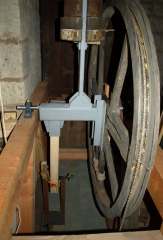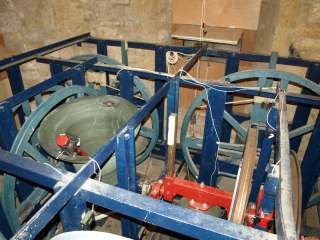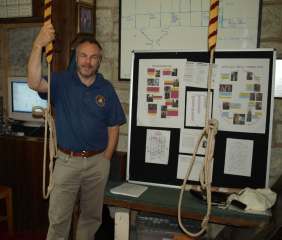 St Peter's Church, Kineton, Warks (Photo: Chris Povey)
St Peter's Church, Kineton, Warks (Photo: Chris Povey)
I visited the Harry Windsor Ringing Centre at St Peter's Church, Kineton, to investigate the skills that are available there to FSG members. Kineton is just outside the FSG area of operation, so the work of the Centre wouldn't normally be included in the Newsletter, but having taken part in a seminar there earlier this year - and been impressed with the setup - I thought it may be beneficial to members to know more about it, particularly as it's so close.
Firstly, what is a Ringing Centre? Here is the Central Council of Church Bell Ringers' definition: A Ringing Centre is a combination of people, tower bells, technology and other facilities designed to help people learn to ring. Centres are intended to promote high standards of teaching and to train teachers of ringing.
The Harry Windsor Ringing Centre is one of 37 such Centres currently within the UK (and 1 in Australia).
The Centre is the brainchild of Graham Nabb, who moved to Kineton four years ago. He found himself with a bit of time and a desire to give something back
to ringing in the form of teaching people to ring. However, it wasn't just teaching people to ring
that interested him; he wanted to teach people to ring properly, that is, with the correct style and action, and the ability to hear and strike the bell accurately. Not only that, he wanted to teach people to ring in a much shorter time than is normal. The basis of this desire to help people ring better derived from his time in Worcester, where occasionally he rang at Bromsgrove. He spent more time there trying to catch flailing sallies than ringing the methods. He resolved to refine his ringing style and investigated what he was doing wrong. He persevered and eventually it paid great dividends, as he gradually conquered the lively bells.
At Kineton, he found a light ring of 6 hanging in an excellent, modern 8-bell frame. He also found the local ringers were progressive and receptive to new ideas, as they'd already installed a ringing simulator. Sound control had been considered. The setup as found was attractive; and importantly, it had a basis for going further.
 The dumb bell: note the old clock weights acting as a bell, and the interesting bungee 'slider' gear.
The dumb bell: note the old clock weights acting as a bell, and the interesting bungee 'slider' gear.
 . . . and what's downstairs: a bellrope and the computer to give the 'bell' some bell sound.
. . . and what's downstairs: a bellrope and the computer to give the 'bell' some bell sound.
Graham is a lively chap; he's the up-and-at-it
sort. It wasn't long before he'd got the Kineton ringers on-board for forming a Ringing Centre based on the Central Council of Church Bell Ringers' template for such. Much activity followed. An appeal for filling the spare pits with two new bells was launched. Adjustable sound control was installed, to allow the bells to be used for long periods. The two new trebles didn't take too long to arrive (they were cast in 2008), one bell being given by the Coventry Diocesan Guild in memory of Harry Windsor MBE, a noted member of that Guild who pioneered a tower sway analysis that allowed the chime of bells at Coventry Cathedral to be hung for ringing in 1987, and after whom the Centre is named. The major part of the hardware for the new Centre was now there, except for one significant item: a dumb bell. For those wondering what this is, it's a false bell with a weight taking the place of the bell. It acts like a bell acts, but with one major difference: it's lighter than a real bell and therefore doesn't have the force to damage people in the way bells do if a learner gets its wrong, ie it's much safer. And one other thing; it doesn't make any noise, so it can be used all day with no complaints about noise.
For those not familiar with bell simulators, these are electronic sensors that trigger an electronic bell noise at the right time as a bell rotates. A target positioned at the relevant point on the bell wheel activates a sensor, which is connected to a computer programmed to make the relevant sound for the bell being simulated (the bell clapper is tied or silenced during simulator use, of course). Although the ringers can hear the bells
in the Ringing Room, absolutely no sound is heard outside, which is yet another way to make a lot of use of bells without attracting complaints about noise.
 A view of the belfry: note wires from the sensors on the bells to the computer, the adjustable sound control, and the 'quickfit' car tyre bell muffle.
A view of the belfry: note wires from the sensors on the bells to the computer, the adjustable sound control, and the 'quickfit' car tyre bell muffle.
Having got the hardware sorted out, a proper management structure was put in place. This consists of a committee of four ringers' Michael Gray from Snitterfield is the Chairman, plus Kineton ringers Graham, Sue Marshall and Nick Gunn. Graham is the secretary and manager. All are well-experienced in teaching. A web-site to advertise the Centre and its services was constructed and the Centre opened for business in 2008.
As the CCCBR definition states, the business of the Centre is teaching people to ring. This can be from scratch and/or to greater things, so what does is do to achieve this? Well, from what I can see - and from the bit I've experienced - a huge amount, which is clearly of benefit to ringing as a whole. I can do no better than to reproduce the information on the Centre's flyer
(although this is dated 2009, so things may have expanded even further):-
 Graham Nabb in his lair (beard due to no shaver point in holiday let!)
Graham Nabb in his lair (beard due to no shaver point in holiday let!)
This indicates a lot of facilities are available. So what does the Centre have? Again, I will quote from the Centre's 'flyer':-
- Eight bells - tenor 10cwt
- Abel Simulator connected to all bells allowing:-
- Individual tuition of listening skills
- An analysis of striking
- Individual method practice
- All 8 bells to be rung silenced to methods
- A front 6 (5cwt) to be rung sounding as a natural 6
- Variable Sound Control
- Handbells
- Teaching facilities (screen & seminar areas) in Church
- Kitchen & Toilet facilities in Church
- Dumb Bell - connected to simulator
- Whiteboard & Flipchart
- Conference facilities available for hire in nearby Village Hall
- Easy parking with local shops, pubs & coffee shop nearby
I expect many are thinking What in Heaven's name does all this cost?
. The flyer again (but with updated costs):-
The Ringing Centre is a non-profit-making organisation and aims only to cover its expenses (and that of St Peter's). Any excess is set aside for new equipment and developing the Centre's facilities. Typically, individual tuition is charged at £2 an hour and group events at £15 an hour (per group). Full day conferences individually costed.
Teaching bell handling from scratch to rounds - set charge of £12 per person in total. Quarter peals on the simulator - £2 per rope.
Where a lecturer travels any distance or where food & drinks are supplied, these expenses will be added at cost.
I'm sure even our most cost-conscious members would recognise these costs as an absolute bargain. Being taught to ring from scratch to rounds for 12 quid? Amazingly good value
is a huge understatement! On a similar note, from what I've seen, the hardware, software and the highly-committed, human input are truly outstanding. The benefits to ringing - and there are many - are very clear to see. The Centre deserves full support in its endeavours; and all power to the elbows of the people running it!
The Centre has a web-site (www.coventrydg.co.uk then choose 'Ringing Centre' from the menu), which outlines the courses and seminars on offer. It also appears on the FSG web-site: choose 'Activities', then 'Non-Guild events' from the menu.
Should the FSG have a Group Training Day there? CMP